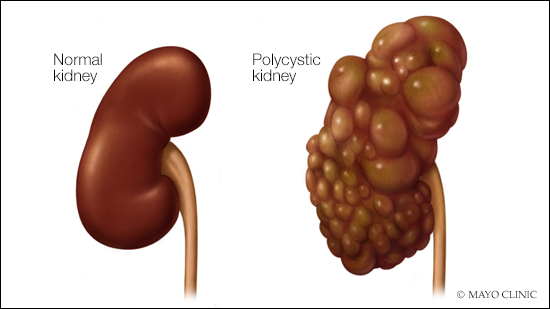Kidney failure can be caused by many reasons: diabetes, high blood pressure, autoimmune diseases and polycystic kidney disease, or PKD.
PKD is an inherited disease that causes cysts to form around your kidneys. The most common form of PKD is autosomal dominant polycystic kidney disease (ADPKD), where it is most often diagnosed in adults between the ages of 30 and 40.
Dr. Fouad Chebib, a Mayo Clinic nephrologist and expert on polycystic kidney disease, says patients understand they face possible kidney failure. That's why researchers continue to innovate.
Now, Mayo Clinic is using artificial intelligence to help predict a patient's progression with ADPKD.
Journalists: Broadcast-quality video (0:57) is in the downloads at the end of this post. Please courtesy: "Mayo Clinic News Network." Read the script.
"For these patients with polycystic kidney disease, and namely ADPKD, half of them would reach kidney failure by their early 50s. And then 75% might reach kidney failure by their early 60s," says Dr. Chebib.

Advances in technology have allowed Dr. Chebib and Mayo Clinic researchers to use data differently.
"Using artificial intelligence, we're able to collect all these data from the imaging particularly, such as the total kidney volume. Now it's part of our clinical practice, where we can obtain the MRI or the CT scan, it goes through our artificial intelligence cloud and then comes back through our radiology team, and then gives us the exact numbers," he says.
Whatever the news might be.
"We can plug those numbers, adjust for age and obtain something called Mayo Imaging Classification, and predict with that the future kidney function — and when potentially they might reach kidney failure or maybe not reach kidney failure," says Dr. Chebib.
It's providing patients information to make decisions about their future.
Keeping your kidneys as healthy as possible may help prevent some of the complications of this disease. One of the most important ways you can protect your kidneys is by managing your blood pressure by following a low-sodium diet, getting plenty of exercise, and avoiding tobacco and excessive alcohol use.
For those who face progression toward end-stage kidney failure, it may be necessary to start kidney dialysis or a have a kidney transplant.
Related posts:
- Vicente Torres, M.D., Ph.D., discusses new findings on tolvaptan as autosomal dominant polycystic kidney disease treatment
- Mayo Clinic Minute: Mayo-researched drug becomes first approved to treat polycystic kidney disease
- Father’s disease inspires son’s journey to find a cure
For the safety of its patients, staff and visitors, Mayo Clinic has strict masking policies in place. Anyone shown without a mask was either recorded prior to COVID-19 or recorded in a nonpatient care area where safety protocols were followed.







